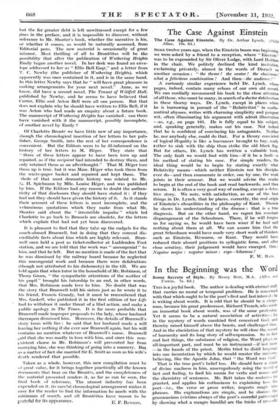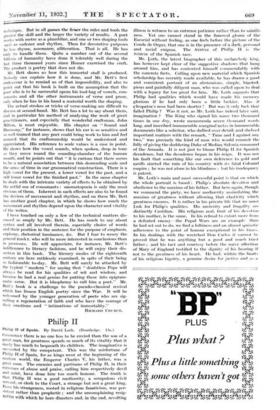In the Beginning was the Word Tins is a joyful
book. The author is dealing with eternal stuff. that carries no moral or temporal problem. He is concerned with that which ought to lee the poet's first and last interest ; he is writing about words. It is odd that he should be a clergy man, because his great predecessor, Richard Trench, who wrote an immortal book about words, was of the same profession. Yet it seems to be a natural association of activities ; for in the mystery of words mankind first conceived God, and thereby raised himself above the beasts, and challenged time. And in the elucidation of that mystery he will close the record of humanity and its long story of self-expression. So in first and last things, the substance of religion, the Word plays an all-important part, and must be an instrument—if not more —in the hands of the priest. Merlin tried to distil language into one incantation by which he would master the universe. believing, like the Apostle John, that "the Word was God:* That is the true poet's belief too.. He should have a strain of divine madness in him, unscrupulously using the world of fact and feeling, to feed his mania for verbs and nouns and the chemistry of sentences. Mr. Bett takes the esoteries for granted, and applies his enthusiasm to explaining how the poet—i.e., the verse or prose writer, imports magic into phrases. His explanations are simple, and he shames the grammarians (victims always of the poet's scornful patronage) by showing .what a meagre handful are the tricks of Prosodic technique. But in all games-the fewer the rules and tools the greater the skill and the larger the variety of results. A poet works with metre as a plumbrme, and one or two shaping tools such as cadence and rhythm. Then for decorative purposes he has rhyme, assonance; alliteration. That is all. He has only to handle them. Quite a nuniber out of the several billions of humanity have done it tolerably well during the last three thousand years since Homer exercised the craft. The product is poetry that does not die.
Mr. Bett shows us how this immortal stuff is produced. Nobody can explain how it is done, and Mr. Bett's first
endeavour is to remind us of that impossibility, and also to point out that his book is built on the assumption that the poet who is to be successful opens his tool-bag of vowels, con- sonants and all the other instruments of verse and prose, only when he has in his hand a material worth the shaping.
The actual strokes or tricks of verse-making are difficult to
discuss at second-hand. Mr. Bett has a lot to say about them, and in particular his method of analysing the work of great practitioners, and especially that wonderful craftsman, John Milton, is most enjoyable. His chapter on " Sound and Harmony," for instance, shows that his ear is so sensitive and so well trained that any poet could bring work to him and feel assured that its craftsmanship would be understood and appreciated. His reference to scale values is a case in point. He shows how the vowel sounds, when spoken, drop in tone as they move round the sounding-chamber of the human mouth, and he points out that " it is curious that there seems to be a natural association between this descending scale and the sense of time in our grammatical construction. There is a high vowel for the present, a lower vowel for the past, and a still lower vowel for the finished past." In the same chapter he deals with the intricate variety of effects to be obtained by the artful use of consonants : onomatopoeia is only the most obvious of them. Inherent in such effects are also to be found the devices of movement and rhythm, and on these Mr. Bett has another good chapter, in which he shows how much the movement and rhythm depend upon the character and vitality of the writer.
I have touched on only a few of the technical matters dis- cussed so amply by Mr. Bett. He has much to say about syntax and all involved therein, especially choice of words and their position in the sentence for the purpose of emphasis, euphony, rhetorical luminance, &c. But I fear to weary the general reach'', who will be more interested in conclusions than in processes. He will appreciate, for instance, Mr. Bett's indifference to literary fashions, and he will enjoy their dis- section in this book. The literary modes of the eighteenth century are here ruthlessly examined, in spite of their being so fashionable to-day. Mr. Bett will surely be attacked by the typical " modern " for saying that " doubtless Pope will alwa)s be read for his qualities of wit and wisdom, and because he had a real genius for putting these into epigram- matic verse. But it is blasphemy to call him a poet." Mr. Bett's book is a challenge to the pseudo-classical revival which has frozen English poetry since the War. It will be welcomed by the younger generation of poets who are sig- nalling a regeneration of faith and who have the courage of their emotions and intimations of immortality."
RICHARD CHURCH.































 Previous page
Previous page